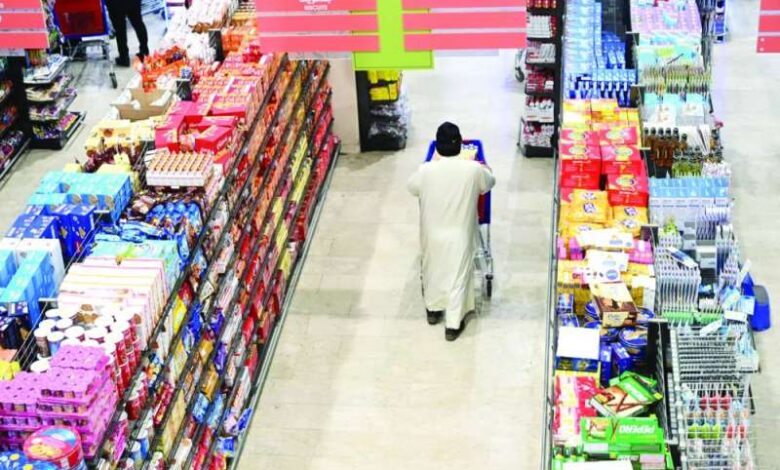
-
Global turmoil exacerbates supply chain instability, driving up global commodity prices and inflation post-COVID-19 lockdowns.
-
Mishaal Al-Manea, Chairman of the Board of Directors of the Consumer Protection Society, emphasized government action to relieve citizens, including targeted support, price controls, farmer support for production, and infrastructure improvements to lower transport costs.
-
Fahad Al-Arbash, head of the Union of Restaurants, Cafes, and Food Equipment, noted significant food price hikes in Kuwait this year, up to 30% for some items, citing global food inflation, increased shipping costs, and export restrictions from certain countries.
The global turmoil—spanning military operations in the Red Sea, the Ukraine conflict, and escalating Middle East crises—poses a significant threat to already unstable global supply chains. These challenges, compounded by the lingering effects of the COVID-19 crisis and global lockdowns, have driven up commodity prices and inflation rates worldwide, the Al Rai newspaper reported.
Kuwait was not immune to the impact of global risks and complications, as confirmed by two experts who noted a rise in food prices in the country during the first half of this year.
This increase resulted from higher shipping and transportation costs, inflation in commodity prices from producing countries, reduced global production, and the effects of climate change on certain products.
They informed Al-Rai newspaper that these price hikes directly affected citizens and consumers, leading to increased prices for several essential goods.
They emphasized the importance of implementing measures to alleviate these burdens, such as policies to control price increases, supporting local farmers to boost production, improving shipping and transportation infrastructure to reduce costs, and regulating the distribution of support to families with limited income who need it most.
Tracking rising food prices amidst global turbulence
At the outset, Mishaal Al-Manea, Chairman of the Board of Directors of the Consumer Protection Society, highlighted the challenge of accurately determining the number of food commodities experiencing price increases. He noted that Kuwait has seen an uptick in the prices of certain essential goods amidst the global situation.
Al-Manea explained that these price hikes stem from various factors, including the global increase in shipping and transportation costs, as well as the impact of international political crises and resulting conflicts that disrupt supply chains.
He also mentioned fluctuations in energy prices, emphasizing that while these factors are predominantly global, there are also local influences such as macroeconomic policies and currency fluctuations that indirectly contribute to price changes.
He noted that the percentage increase in prices of essential commodities varies depending on the specific commodity and market conditions. Generally, there has been an increase ranging from ten to thirty percent in some cases, with measurement depending on factors like commodity type, suppliers, and production costs.
He emphasized that these price hikes are causing increased operational costs for restaurants, potentially prompting them to raise meal prices or reduce portion sizes to mitigate these impacts. He also suggested encouraging citizens to seek more affordable local alternatives and supporting cooperatives and initiatives aimed at providing goods at reasonable prices.
Al-Manea stressed the need for the government to take measures to ease the burden on citizens, such as regulating support provision to limit it to families with limited income, implementing policies to control prices, supporting local farmers to enhance production, and improving shipping and transportation infrastructure to reduce transport costs.
Food prices increase in Kuwait
Fahad Al-Arbash, head of the Union of Restaurants, Cafes, and Food Equipment, highlighted significant food price increases in Kuwait during the first half of this year, reaching up to 30 percent for certain goods. He attributed these increases to global food inflation, rising shipping costs, and export restrictions imposed by some countries to stabilize local prices.
Al-Arbash noted specific commodity increases, such as frozen chicken imported from Brazil rising from 600 fils to 900 fils, and local chicken increasing from one dinar to 250 fils. He also mentioned substantial rises in rice prices due to global climate challenges affecting cultivation, and unprecedented cocoa bean price hikes linked to disease outbreaks in West African farms and market complexities.
He pointed out that this increase has burdened restaurant owners, caught between rising product prices and strict supervision by the Ministry of Industry and Commerce, which prohibits any meal price increases.
He explained that restaurants are only allowed to adjust their prices according to a list submitted to the ministry, and any changes must be approved by the Ministry of Industry and Commerce. Violations may lead to referral to the Commercial Prosecution on charges of commercial fraud.
Kuwait’s restaurant prices lead the Gulf in affordability
Al-Arbash stressed that the best way to combat fraud in restaurants, if it exists, is to liberalize meal prices, especially since some prices have remained unchanged since the 1980s, such as ‘grills’ and certain sandwiches priced at 100 fils. This stagnant pricing inevitably impacts product quality. He emphasized that restaurant prices in Kuwait are the lowest compared to other Gulf countries that have adopted price liberalization policies.
Measures to control prices
- Implement policies to curb price increases.
- Support farmers to boost local production.
- Improve infrastructure to reduce transportation costs.
- Regulate support distribution to those in need.












